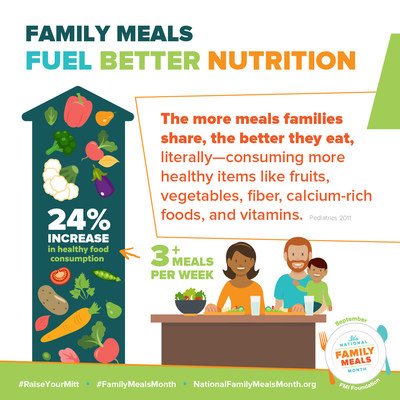Provides Insights and Solutions for Increasing Frequency of Family Meals
ARLINGTON, Va., Aug. 31, 2017 /PRNewswire/ -- As the nation readies for National Family Meals Month ™ this September, the Food Marketing Institute (FMI) Foundation today releases The Power of Family Meals, an authoritative, in-depth white paper on the evolving and complex topic of family meals in the United States. The paper includes a review of numerous consumer research reports along with an examination of independent studies published over the past decade and provides potential solutions for cultivating a greater cultural environment for dining together at home.

"For years, we have witnessed a constant trickle of studies that have shown the changing dynamics of family mealtime behavior and the barriers that exist to sharing meals at home," said Sue Borra, RD, executive director of the FMI Foundation. "We thought it was time to look at the comprehensive body of consumer and scientific research to assess the societal challenges of family meals. More importantly, we sought to provide strategies to elevate family meals; thePower of Family Meals report does both."
The Hartman Group, a recognized thought leader on consumers, food and beverage cultures and trends, produced the 10-page assessment, which is replete with facts and figures addressing the following key themes:
- Family meals are beneficial. Numerous studies have found that eating with others, particularly family, is associated with healthier dietary outcomes for children and adults.
- Family meals usually fail to happen. Daily behaviors suggest that parents eat home-cooked dinners with their child or spouse only half the time (3.5 times out of 7 possible dinners each week).
- Barriers to family meals. The primary obstacle for missed family meals is differing schedules reported by 55% of adults living with children, 47% of adults living together without children).
- America's changing families. Today's eaters live in dramatically different household structures and habits from the traditional family that once revolved around married life and children.
Most importantly, the report concludes with solutions to elevate family meals, most notably, a recommended strategy to align eaters, appetites and food. This includes many potential tactics such as:
- Honoring the Dinner Hour – to preserve the sanctity of dinnertime among Americans with intractable schedules even if it means reserving options for narrower windows of time.
- Shifting Dayparts – to modify the timing of social eating to breakfast considering that it might be easier for busy families to connect before the day starts when busy evening schedules persist.
- Making a Family of Friends – to encourage young adults living alone to connect with each other for home-cooked dinners.
To help American families achieve the goal of one more meal at home each week, the FMI Foundation has developed a website, www.NationalFamilyMealsMonth.org. In addition to consumer tips, the website also includes links to numerous partners – primarily food retailers and manufacturers –committed to helping consumers achieve their increased family meals goal. In short, families can find support from their favorite local food retailer and food brands.
No comments:
Post a Comment